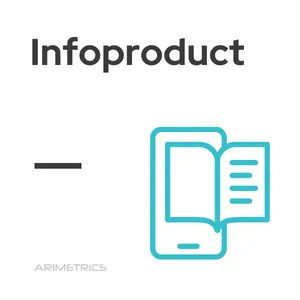 Definition
Definition
An infoproduct is a type of digital product that conveys information, knowledge and/or skills. The infoproduct usually exists in the form of an ebook, video course, online training or other digital medium. It can be used to provide knowledge on various topics, such as business, finance, health, and education. In addition, infoproducts are often created by experts in their respective fields and can be used as a way to monetize that experience and knowledge.
Advantages of infoproducts
Infoproducts are a popular way to monetize a website or blog, as they can provide a source of passive income. They can also be used to provide value to customers and foster brand loyalty.
There are many advantages associated with infoproducts, including their ability to reach a wide audience of potential buyers. Since infoproducts are usually distributed online, they can be accessed by anyone with an Internet connection from anywhere in the world. This makes infoproducts an ideal way to reach a global audience, especially for businesses and individuals looking to expand their reach and grow their customer base.
In addition, infoproducts can be created relatively quickly and easily, which means that entrepreneurs and experts have the flexibility to generate new content and products at a rapid pace. This can help them keep up with trends in their field and adapt quickly to market changes, making infoproducts a very effective way to remain competitive.
Types of infoproducts
As examples of infoproducts we can highlight:
- e-Books: Electronic books that can be read on devices such as tablets or e-readers. Example: “The 4-Hour Workweek” by Tim Ferriss, an e-book that offers strategies for optimizing productivity and reducing work hours.”
- Templates: Design files that can be used to create documents or layouts. Example: Graphic design templates for Canva, used to create presentations and social media posts quickly and professionally.
- Software programs: Computer applications that can be downloaded and used on personal devices. Example: Video editing applications such as Final Cut Pro, which offer advanced tools for the production of audiovisual content.
- Audios: Radio programs or podcasts that can be listened to via mobile devices or online. Example: Business development podcasts on platforms such as Spotify, featuring interviews with industry leaders and practical advice.
- Digital magazines: Periodicals that can be read online or downloaded in digital format. Example: Technology periodicals that provide product reviews and industry trends.
- Online courses: Online learning programs that may include tutorials, videos and assessments. Example: Programming courses on platforms such as Udemy, where languages such as Python and Java are taught from basic to advanced levels.
- Guides: Documents or online resources that provide instructions or tips on how to do something or on a specific topic. Example: Step-by-step guides for learning how to use tools such as Photoshop, which include detailed tutorials and practical examples.
- Apps: Mobile applications that provide a variety of services and tools to users. Example: Mobile fitness apps that offer personalized exercise routines and progress tracking.
Infoproduct Marketing Strategies
To maximize the success of infoproducts, it is essential to implement effective marketing strategies that attract the right audience and convert interest into sales.
- Content Marketing: Create blogs and videos that provide free value.
- Email marketing: Use email campaigns to inform about launches and offers.
- Social networks: Promote infoproducts on platforms such as Instagram and Facebook.
- SEO techniques: Optimize content to improve search engine visibility.
- Free trials and demos: Offer free samples to evaluate the value of the product.
- Testimonials and reviews: Include opinions from satisfied customers to increase credibility.
